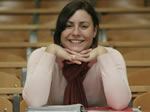
Jana Urbanija goes on to university after informal education programme co-funded by the European Social Fund.
A student at the university of Ljubljana, Jana Urbanija is enthusiastic about the future. The 26-year-old is reading geo-technologies and has set her sights on a career in the mining industry.
“I want to become an engineer,” she says.” I want a job where I can work on large-scale projects in different countries around the world.”
However, the path she followed has not always been smooth and a few years ago her future did not look so bright. Her teenage years growing up in the region near Lake Bled were turbulent.
“When I was growing up I had lots of problems,” she says. “My father was a drunk and my parents divorced. I first ran away from home when I was six years old and I was depressed from the age of 12.”
A downward spiral
She loved sport, but had to give up many activities due to problems with her knees – increasing her already growing sense of alienation. “I didn’t fit in and my life sucked.” Her search to find a place where she belonged led her to start experimenting with drugs. “It started off as a social thing, at parties and clubs, but it got more serious.”
She began taking ecstasy everyday and her drug use soon escalated to harder drugs. “I was taking up to five pills a day. I then started taking heroin to come down.”
She began stealing to fund her rapidly growing addiction and her behaviour estranged her from her friends. “We were on a different wavelength. I didn’t really care about anything. At school I became a loner and I started to search out druggy friends.
“In the end I was spending more time in bars than at school,” she says. Perhaps predictably, she failed in the last year of school and dropped out. “And I was getting in more and more trouble with the police.”
A programme of informal education co-funded by the European Union through the European Social Fund helped her to begin to change her life. The PLYA project is aimed at helping young people who do not complete their regular education to get into employment. It works through projects in arts and crafts, practical learning, life skills, personal development and counselling.
A turnaround
For Jana, it helped her begin to turn her life around. “It was what I needed. I began to see I could live a different way.”
Jana immediately noticed a positive difference compared with her previous educational experiences. “At school they treat you like a number. But on the course they treated me like an individual.
“All the people there were in the same boat, they had all been pushed out of the regular system,” she says. “So there was a good atmosphere. Everybody supported each other, there was no competition and we were able to be ourselves.”
She attended the course for a year. However, she was still doing drugs, but at this point she began to realise that she wanted to get clean. “I was becoming crazy, “ she says. “I was scared that I would end up in a mental institute or die.”
She decided to go to a closed community in order to get off drugs and get her life back on track. “It was very hard, “ she says. The community, organised by a catholic organisation based in Italy, was strict – no television, minimal contact with the outside world, few material comforts and a programme of hard physical work. “It was worse than the army,” says Jana.
But even harder than the physical work, says Jana, were the personal changes. “You have to accept how you are and then work to improve yourself. You are given responsibility and you come out as a person. You get to see your faults,” she says.
“It was like a hell, but now I have good memories because the community is so pure. It’s honest and you make great friendships. There are beautiful moments because the life there is so pure,” she says.
After nearly three years, Jana felt ready to face the world again. She returned home in 2004. “My old friends accepted me and that was a big help.
“I started studying again immediately. The worst thing [for a drug addict] is to be lonely and alone.” She retook her school exams and then did a further course to get into the university course that she is now doing.
Giving something back
Jana is philosophical about the past and realises she had a lucky escape. “I’m really grateful for all the help I got and the people who were there for me,” she says. “I received a lot and I want to pay it back.”
She works night shifts at a centre for young people with drug and alcohol problems, using her experience to help others going through difficult times. She supervises the adolescents staying there and gives them advice when she can.
“I’d like to establish a community like the one I went to, but to help people suffering from depression,” she says. “But that’s a long term aim. At the moment I’m just enjoying what I’m doing and looking forward to the future.”
